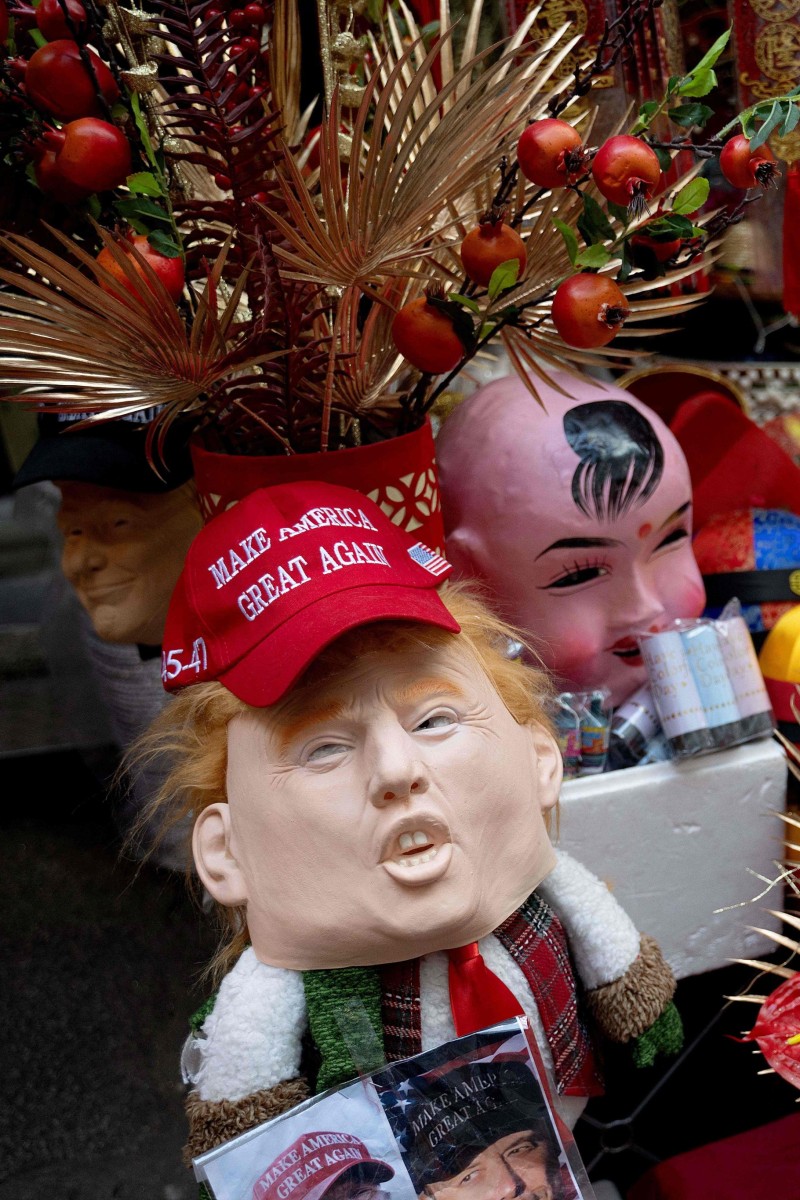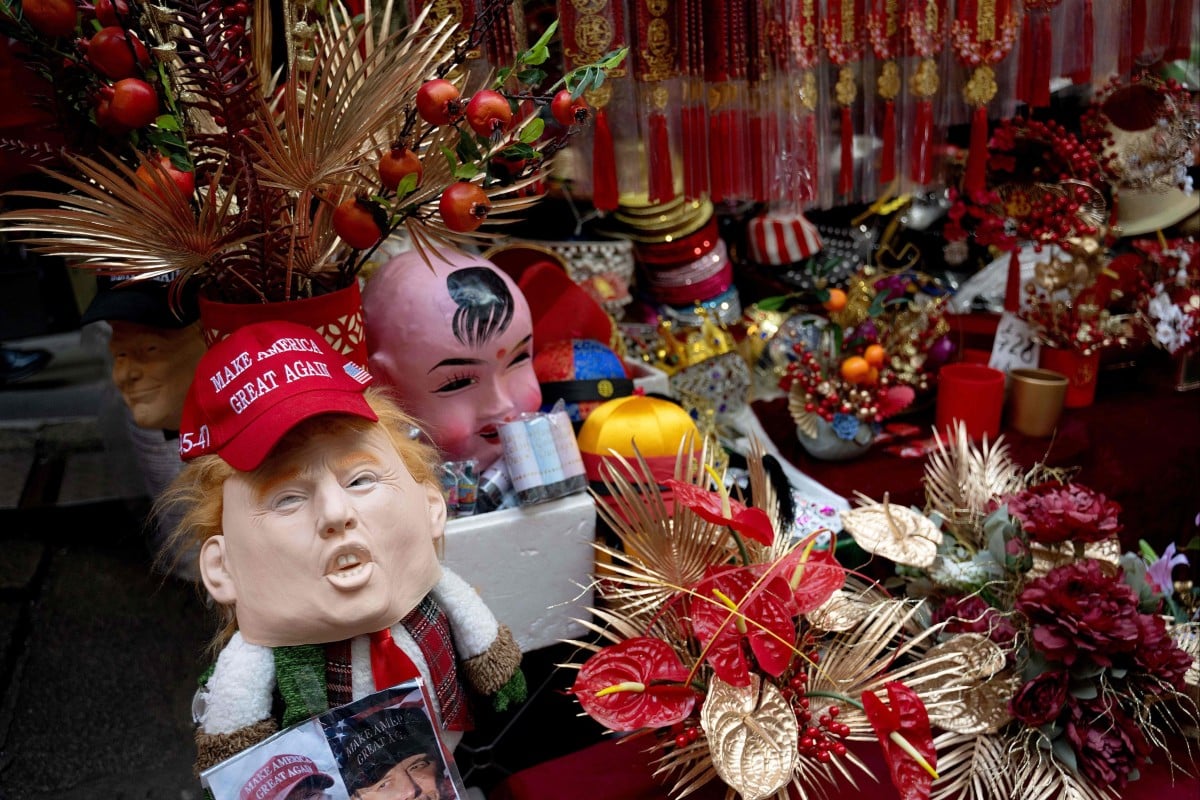
Your Voice: A new Trump trade war, reducing smoking in Hong Kong (long letters)
Readers discuss the new proposed tariffs on China by the United States and how to help people with smoking addictions.
 A rubber mask in a market stall in Hong Kong depicting US President Donald Trump, who has promised harsher tariffs on China in his second term. Photo: AFP
A rubber mask in a market stall in Hong Kong depicting US President Donald Trump, who has promised harsher tariffs on China in his second term. Photo: AFPHave something to say? Send us a letter using this form.
Trump’s tariff tactics
Jayden Poon, German Swiss International School
United States President Donald Trump announced January on his media platform Truth Social that he plans to pursue an aggressive new tariff policy, which will include significant increases in import costs for goods from China, Mexico and Canada.
This cost is in addition to his intentions to charge an additional 10 per cent fee on all imports from China.
A tariff is a government-imposed tax on imported goods from other countries to increase their price and make those imports less desirable to help protect domestic goods from foreign competition.
Trump’s tariff proposals are especially significant because of the trading volume between the United States and China, which hit over US$501 billion (HK$3.9 trillion) in 2023, according to the global trade platform United Nations Comtrade Database.
This turn in American economic policy is not surprising: protecting domestic manufacturing and attracting foreign investments is a central part of Trump’s election campaign. However, economists note that tariffs generally increase costs for consumers.
Trump inauguration: TikTok, executive orders and reactions in China
How might this new policy affect Hong Kong?
Pointing to the precedent set during the last Trump term, Hong Kong companies operating in mainland China saw the price of both raw materials and production increase due to US tariffs.
Another factor was Hong Kong’s special trading status – which allowed Hong Kong imports to carry a lower tariff than mainland China – which was removed in 2020.
Chen Zhiwu, chair professor of finance at the University of Hong Kong, told the South China Morning Post that US tariffs will undoubtedly hurt Hong Kong’s economy, but the election result may lead to Beijing focusing more on economic policies than geopolitical issues.
Businesses have come up with emergency measures. Wingco Lo Kam-wing, president of the Chinese Manufacturers’ Association of Hong Kong, also told the Post that tariffs would significantly affect the city but offered measures such as starting factories in Southeast Asia to combat the US policy.
As this is an ambitious policy to protect domestic goods, we will see if Trump’s planned tariffs will disrupt trade and affect Hong Kong, and other regions worldwide, more than his last term’s policies.
Tackling smoking
Horii Ayaka, YCH Lim Por Yen Secondary School
Smoking has a detrimental effect on you, your loved ones and society as a whole. These adverse effects are not confined to a person’s physical health, extending deeper into your mental health and state.
It cannot be overstated how bad smoking is for you.
The health risks and complications include and are not limited to lung cancer, heart attacks and strokes. When you smoke, you expose almost all of your vital organs to harmful toxins, leading to a range of diseases, often chronic. The habit threatens your life expectancy and general quality of life.
Drug misuse also affects more than your body.
Reducing smoking, air pollution, isolation and other risk factors could prevent dementia
Loved ones, like children and family, witness and experience the second-hand effects of substance abuse and addiction. The strain in relationships can contribute to anxiety, depression and worsening of personal relationships.
Constant arguments plague families where a member struggles with addiction, and children are likely to worry and struggle, too. This results in stress, emotional turmoil and resentment. The bitterness that smoking causes is real, lasting for a long time, sometimes forever.
On a wider scale, secondary smoke poses grave health risks to non-smokers, particularly vulnerable and immunocompromised people in public spaces who are involuntarily subjected to fumes.
We need to help people quit smoking and also prevent them from starting in the first place.
One way is through smoking-related information. Schools, universities, workplaces and community centres have a role to play in educating the public. It is also necessary to create support systems for people who are trying to stop smoking. This can include counselling services, support groups and hotlines for advice and encouragement.
In addition, promoting healthy habits – like physical activity, a balanced diet and stress management – could deter people from looking to smoking as an outlet. Funding Hong Kong’s sports, art and cultural sectors could give people options for hobbies and activities that can substitute for the urge to smoke.
A few more ways we can reduce the smoking rate include enforcing bans on smoking in public places, raising tobacco product prices or putting restrictions on product advertising. This might also discourage non-smokers from picking up smoking.
Together, we can tackle smoking in Hong Kong.
